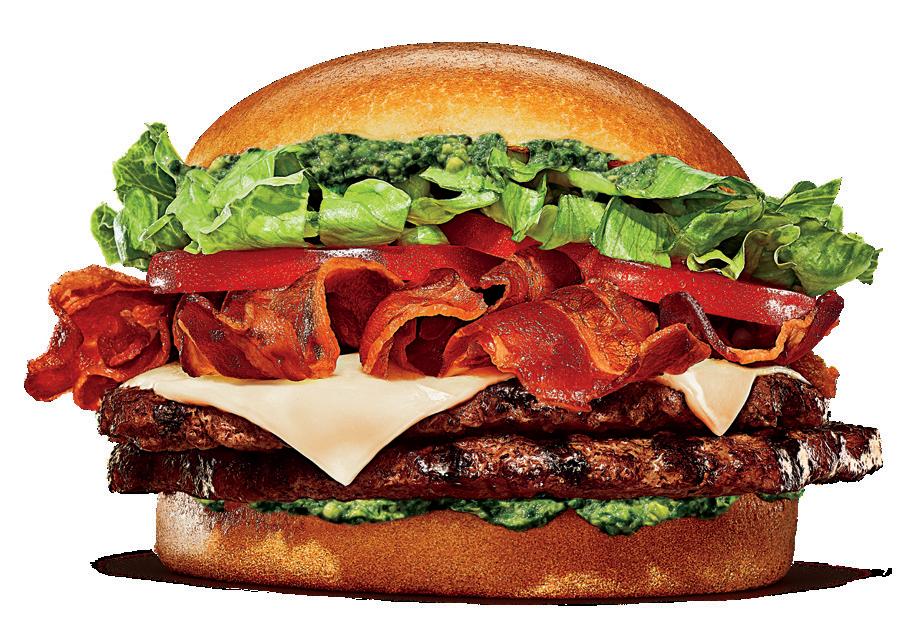













Davis: US satisfied no forced labour in The Bahamas
By E ARYEL BOWLEG Tribune Staff Reporter
ebowleg@tribunemedia.net
PRIME Minister Philip
“Brave” Davis said he believes US officials are “satisfied” with The Bahamas’ handling of Cuban medical labour contracts following high-level talks this week, even as he stopped short of committing
MINNIS
to any reform to ensure the workers receive a greater share of their salaries. His remarks came during a press conference following Washington, DC meetings with US Secretary of State Marco Rubio and Treasury Secretary Scott Bessent. The meetings involved concerns over Cuba’s state-run
By LYNAIRE MUNNIN GS Tribune Staff Reporter
lmunnings@tribunemedia.net
FORMER Prime Min-
ister Dr Hubert Minnis’ declaration in the House of Assembly yesterday that he looked forward to continuing his representation of Killarney was met with desk-thumping applause from parliamentarians across the chamber yesterday –– but uncertainty about whether he would seek re-election after being dropped as a candidate by the Free National Movement remained high.
“I come to this place every meeting as a member of the Free National Movement on behalf of the

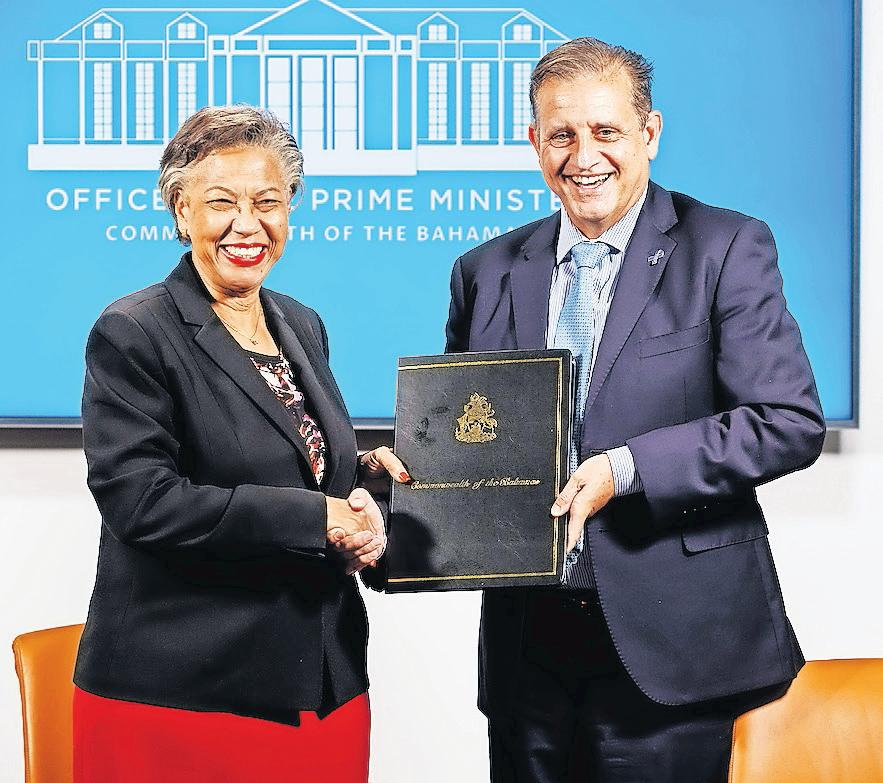
By FAY SIMMON S Tribune Business Reporter jsimmons@tribunemedia.net
A $400M heads of agreement was yesterday signed by the Davis administration with the Bahamas Aviation, Climate and Severe Weather Network (BACSWN) to enhance meteorological services and improve flight tracking.
first NextGEN meteorological watch office.
Prime Minister Philip “Brave” Davis said the partnership will “strengthen our national resilience” through the establishment of what is described as the country’s
Mr Davis said the agreement will “bring with it an investment of over $400m over three years”.
“This is a major step forward. The new Watch Office, alongside BACSWN’s advanced weather and flight-tracking
technologies, will allow The Bahamas to monitor atmospheric and aviation conditions in real-time across every part of our archipelago. It will place us among the most capable meteorological jurisdictions in the

medical export programme, which the United States considers exploitative and potentially tantamount to forced labour.
“The secretary affirmed that any country that is engaged in forced labour, they would have a policy of restricting visas to officials in that country,” Mr Davis said. “But the question is whether you are engaged in forced labour. We were able to say to them — and I think they were satisfied — that we are not engaged in forced labour that we are aware of.”
Documents published recently by the Free Society Project (Cuba Archive) suggest The Bahamas pays thousands of dollars monthly for each Cuban healthcare worker, yet allows only a small fraction — between $990 and $1,200 — to go directly to the professionals. The balance reportedly goes to the Cuban state agency
Comercializadora de Servicios Médicos Cubanos, SA (CSMC).
When asked directly whether he would support changing the contract to ensure Cuban professionals receive more of their salary directly, Mr Davis deflected.
Instead, he framed the issue in historical terms, likening it to agreements in the mid-20th century when Bahamian workers abroad had part of their wages withheld by the British government.
“Let’s make it clear: the concept of the ingredients of forced labor have several factors,” he said. “Sharing an employee’s salary with a government could be perceived that way. Holding person’s passport could be perceived that way. But there are number of ingredients in respect to paying salaries back to the Cuban government. I was able to say to the Secretary that the concept is not unknown.”
The contract system, driven by US agricultural
demands during World War II, saw Bahamians recruited to work in the United States. In The Bahamas, deductions were split between a savings fund and relatives back home –– far different from what happens in the case of Cuban workers today.
Asked whether the amount withheld should be the focus of concern, Mr Davis downplayed the significance of how much is paid to workers.
“It was the principle, not the amount,” he said. “Now, the amount comes into play when you want to get emotional about it and to make a point, but they’re more concerned about the principle that a person is hired and part of their salary that they work for they’re not getting.”
Mr Davis did indicate that payments might eventually be made directly to workers’ accounts, but he gave no timeline or commitment. Meanwhile, he asserted that The Bahamas is reviewing
its labour agreements with Cuba and other countries, including the Philippines.
The issue has become sensitive. US officials have hinted at visa sanctions for foreign government officials involved in labour arrangements deemed coercive.
When pressed about releasing the contracts to the public, Mr Davis claimed the contracts were already public — a claim that has not been substantiated, as The Tribune could not find any such disclosures by the Bahamian government.
“I don’t know why we would want to publicise them anymore,” he said.
Mr Davis said he also expressed The Bahamas’ concerns about the US’ aggressive recruitment of local nurses, which he warned is depleting the country’s healthcare workforce. He said US officials acknowledged the strain and expressed willingness to cooperate.
By EARYEL BOWLEG Tribune Staff Reporter ebowleg@tribunemedia.net
PRIME Minister Philip
“Brave” Davis has again called for greater accountability from the United States in the regional fight against firearms trafficking, suggesting that US gun buyers whose weapons are found in The Bahamas should be held responsible.
He said he discussed the issue with US officials during a high-level meeting with them in Washington, DC, this week.
Mr Davis said that while “straw purchasing” — buying firearms on behalf of others — is already a crime, the region needs stronger safeguards and enforcement.
“If a gun purchased in
the US is later found in The Bahamas, the buyer should be held accountable for all the firearms they bought,” he said. “That is something being taken under advisement as well to strengthen the laws in the United States for that purpose.”
He noted that US officials acknowledged the severity of the issue and pledged to increase intelligencesharing, bolster regional security cooperation, and support border management under initiatives such as the Caribbean Basin Security Initiative and Operation Bahamas Turks and Caicos (OPBAT).
“There is an urgent need for enhanced regional cooperation to combat drug and firearms trafficking and illegal migration,” he said.
Mr Davis’ meeting, along
with fellow Caribbean heads of government and US officials, included Secretary of State Marco Rubio and Treasury Secretary Scott Bessent.
Mr Davis also said Caribbean nations have assured the US they will remain alert to any breaches of diplomatic norms amid growing tensions between Washington and Beijing.
“We are smaller developing states. We are not going to get involved in the issue, but we will guard ourselves against the concerns that are expressed by the United States,” he said, “to ensure that our country, our jurisdiction, is not used for the predatory practices that they are afraid of or concerned about.”
US Department of State spokesperson Tammy

Bruce has said Secretary Rubio urged Caribbean partners to choose vendors and contractors for infrastructure projects responsibly to prevent exploitation and privacy violations by “malign actors like the Chinese Communist Party.”
Mr Davis acknowledged the US view that China’s involvement goes beyond infrastructure, hinting at privacy intrusions and longterm security implications.
He said he hopes The Bahamas won’t be placed in the geopolitical crosshairs as a result of the superpower rivalry.

Also raised during discussions was the US naval base at AUTEC in Andros, with Davis emphasising that Bahamians should see meaningful economic benefits from its operations.
Regarding the region’s other crises, Mr Davis highlighted the situation in Haiti. While welcoming the US sanctions against Haitian gang leaders, he said more comprehensive action is needed.
“Haiti needs solutions that address security,
governance, and long-term economic development,” he said. “We believe there is a willingness – through bilateral channels and multilateral mechanisms — to build a more stable, secure future for the Haitian people and the region.” He noted US support for ongoing multilateral missions in Haiti and pointed out that some gang leaders were allegedly backed by individuals residing in the US.

NULLIUS ADDICTUS JURARE IN VERBA MAGISTRI
“Being Bound to Swear to The Dogmas of No Master”
LEON E. H. DUPUCH
Publisher/Editor 1903-1914
SIR ETIENNE DUPUCH, Kt., O.B.E., K.M., K.C.S.G., (Hon.) LL.D., D.Litt .
Publisher/Editor 1919-1972
Contributing Editor 1972-1991
RT HON EILEEN DUPUCH CARRON, C.M.G., M.S., B.A., LL.B.
Publisher/Editor 1972-
Published daily Monday to Friday
Shirley & Deveaux Streets, Nassau, Bahamas N3207
TELEPHONES
News & General Information
(242) 502-2350
Advertising Manager (242) 502-2394
Circulation Department (242) 502-2386
Nassau fax (242) 328-2398
Freeport, Grand Bahama (242)-352-6608
Freeport fax (242) 352-9348
WEBSITE, TWITTER & FACEBOOK
www.tribune242.com


US Catholics ‘at crossroads’ regardless of who new Pope is
MORE than 130 cardinals entered the Sistine Chapel on May 7, 2025. With the announcement “Extra omnes” –“all out” – the doors have been closed and the cardinals sequestered to elect the next leader of the Catholic Church. They will vote, confer, pray and vote again until a candidate acquires the twothirds majority needed to become pope.
Ten of the men voting this week are from the United States. The Conversation U.S. asked Maureen Day, a researcher at the University of Southern California who has written several books about the contemporary church, to explain what Catholicism looks like in the U.S. at this high-stakes moment. How is Catholic identity and practice in the U.S. changing, compared with a generation ago?
In 1987, the year of the first American Catholic Laity survey, nearly half of American Catholics said that faith was “the most” or “among the most” important parts of their life. Now, only 37% say the same. Others are leaving the Catholic Church completely. The General Social Survey, a national survey conducted every year or two since the 1970s, asks people about the faith they grew up with, as well as their present religious identity. According to our analysis of its data, in 1973 only 10% of Americans who grew up Catholic had changed religions, and another 7% had left religion altogether. By 2018, each of those percentages had increased to 18%.
A Pew Research Center study conducted in 2024 found that for every American who converts to Catholicism, another 8.4 leave. The only reason that Catholicism is able to maintain a relatively steady share of the U.S. population – about 20% – is due to the high percentage of immigrants and migrants who are Catholic.
So my co-authors and I chose the title of our 2025 book, “Catholicism at a Crossroads,” quite intentionally. The church has been facing a variety of challenges for decades, both nationally and across the globe. It’s not just about disaffiliation, but also issues such as the sexual abuse crises and bishops’ decreasing influence on lay Catholics’ personal decisions.
In response, church leaders have mostly offered minor adjustments, such as encouraging parishes to become more family- or young adult-friendly. They have not yet made larger shifts that could substantially alter some of those trend lines.
Some of your work focuses on what you call ‘cultural Catholics’ defined as Catholics who attend Mass less than once per month. How would you describe cultural Catholicism in the U.S. today?
A big concern of Catholic leaders right now is decreasing Mass attendance, as weekly Mass is an important precept of the Catholic Church. Sunday Mass is a place for Catholics to participate in the sacraments, strengthen their faith and build relationships with other Catholics.
One of the things Catholic leaders tend to attribute this drop in attendance to is a broader trend of secularism. There might be some merit to this, but it can’t be the whole story. In our analysis of General Social Survey data, for example, the percentage of Protestant Christians who say they attend worship services weekly was 35% in 1950 and 40% in 2023. Among Catholics, however, weekly Mass attendance has declined from 63% to 30% in these same years.
“Cultural Catholics” who say they attend Mass “a few times a year” or “seldom or never” account for 53% of U.S. Catholics. Many of them demonstrate strong ties to Catholic teachings in other ways. For example, around 70% to 80% of cultural Catholics say that it is “essential” or “somewhat essential” to Catholicism to help the poor, have a devotion to Mary and practice daily
prayer. There are findings that can lend themselves to either a “glass half empty” or “glass half full” interpretation. For instance, it might be heartening to Catholic leaders to know that 62% of cultural Catholics say it is important that future generations of their family are Catholic – although this is much lower than the 89% among those who attend Mass frequently.
And when these cultural Catholics imagine future generations of their family being Catholic, what does that mean? Perhaps it entails simply a few milestones, like receiving baptism, First Communion and possibly Confirmation – the three sacraments that initiate a person into the Catholic faith. The way many cultural Catholics are loosely tethered to the church, without much involvement in parish life, is a great concern for many Catholic leaders. What main challenges do you see for the American church under the next pope?
I would argue that the American church’s biggest challenge is how to heal the factionalism within itself.
On the one hand, there is a great deal of common ground among the most active Catholics, even with the diversity still found here. According to our analysis, 20% of Catholics are “high commitment”: those who say they attend Mass weekly, are unlikely to leave the faith, and that the church is very important to them. These Catholics are more likely to depart from their political party’s position on an issue if it does not align with Catholic teachings. For example, high-commitment Catholic Republicans are much more likely to support the bishops’ position on making the immigration process easier for families. High-commitment Catholic Democrats, meanwhile, are more likely to be against abortion than are their moderate- or low-commitment counterparts.
In other words, these high-commitment Catholics tend to be less polarized and could find common cause with one another.
However, there are more extreme pockets – such as those who called into question the legitimacy of Francis’ papacy – that are more militant about their vision of Catholicism. While these Catholics are few in number, they are very vocal. There are fringe groups that mobilized to try to change the direction of the Catholic Church after Francis’ papacy, which they saw as a series of liberal reforms.
Within more mainstream Catholicism, there are divides over styles of worship, with media attention on some young Americans flocking to more conservative or traditional parishes. However, sociologist Tim Clydesdale and religion scholar Kathleen GarcesFoley found that young adult Catholics are split: While some are attracted to churches with pastors who demonstrate “orthodoxy,” a similar number prefer “openness.”
What do you wish more people understood about Catholicism in the U.S.?
I think the “missing piece” for many is the incredible diversity of U.S. Catholicism, from race and ethnicity to politics and practice. Many Americans tend to associate the religion with one or two issues, such as abortion and same-sex marriage, and assume that Catholics are fairly monolithic, both in their demographics and their politics.
Catholics themselves can also forget – or never learn – that their small slice of Catholicism is not the whole of Catholicism.
Recognizing and elevating what unites this vast family of Catholics, both personally and collectively, is going to be critical as the church moves forward.
By MAUREEN K DAY USC Dornsife College of Letters, Arts and Sciences
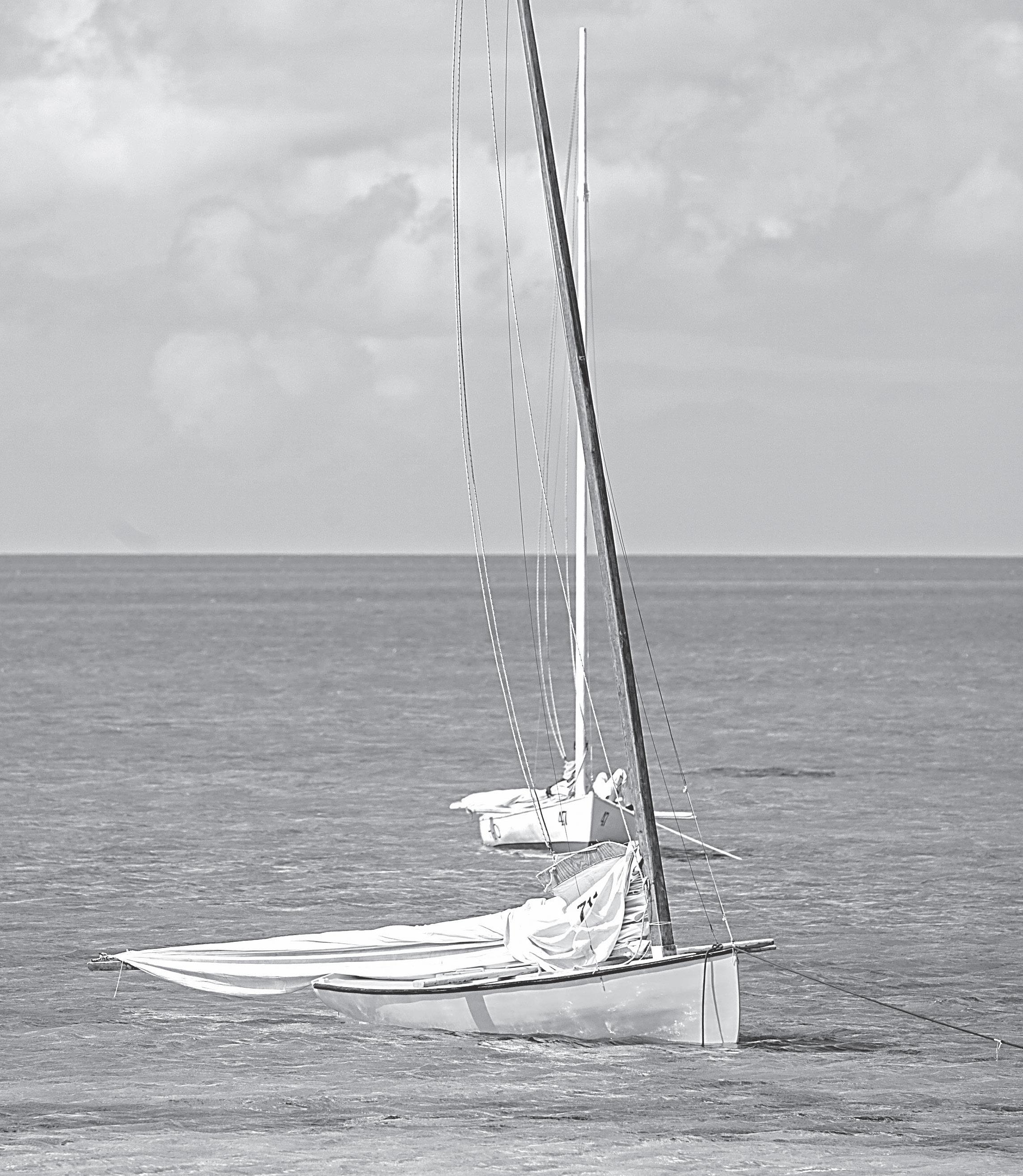

EDITOR, The Tribune.
“YET it shall not be so among you; but whoever desires to become great among you, let him be your servant…” — Matthew 20:26
Across the islands of The Bahamas, there is a growing conversation around leadership—its character, its trajectory, and its responsibility to the people. Recently, this conversation took root in a church setting, during Pastor Mario’s sermon series “Be Great,” based on Matthew 20:23–28. Jesus’ words reframe what it means to rise: to be great is to serve. This simple truth disrupts everything we’ve come to accept about leadership in our political space.
In The Bahamas, we’ve watched a troubling pattern emerge over decades: a shift from the posture of servant to the persona of sovereign—where public office often becomes synonymous with power, privilege, and distance. And though every citizen has a right to their own perspective, there are observable and widely discussed patterns that warrant national reflection.
The views expressed in this reflection are grounded in public observation, historical record, and social discourse. They are not intended to defame any individual but to examine leadership patterns that have become increasingly evident to many Bahamians. Where allegations or perceptions are noted, they are labeled as such, with full respect to differing perspectives, political loyalties, and public interpretation.
Over the decades, we’ve seen leaders begin with noble intentions, only to drift from their initial posture of service. The following is a national observation, not a personal indictment.
our founding father, gave us independence—an undeniably monumental achievement. Yet over time, he was widely perceived as increasingly distant, with allegations of presiding over corruption and an elitist political
culture. These remain contested by supporters but have been documented in the national memory and public record.
hailed early on as a reformer and the voice of change, introduced the idea of “government in the sunshine.” Yet in practice, he was often seen as consolidating power and centralising decisionmaking, leading some to describe his leadership as more managerial than ministerial, with critics alleging a posture akin to totalitarianism—though such labels remain controversial.
for his grace and deliberative style, initially embodied a kind of humility in leadership. However, many Bahamians observed a growing passivity and disconnection during his tenure. Supporters may point to his intellectual depth and charisma, but critics describe his leadership as slow-moving and out of touch during crucial national moments.
paigned as a man of the people, tapping into a narrative of change and populism. But during moments of national crisis—particularly the COVID-19 pandemic— he was widely criticised for isolating himself from the people, both literally and figuratively, as his tone and decisions became increasingly distant and authoritative. These are verifiable public concerns, though his defenders argue he was simply doing what was necessary to manage a complex crisis.
rent Prime Minister, speaks often of “believing in Bahamians,” and presents a diplomatic front on the global stage. Yet many in the public have raised concerns that his administration appears more invested in foreign deals, international partnerships, and ceremonial
engagements, while core domestic issues—housing, education, economic empowerment—remain unresolved. These are ongoing national observations, not personal judgments.
This is not a matter of political preference—it’s a question of national alignment. The consistent shift from service to self-preservation, from local accountability to international optics, is not sustainable. It speaks to a deeper erosion: a loss of the moral compass that once defined public leadership. When those in power elevate themselves beyond the people, we must ask— have we mistaken the throne for the mission? Have our leaders forgotten that the path to true legacy is paved not in applause or access, but in sacrifice and surrender?
Jesus did not denounce the desire to lead—He redefined the path. “Whoever desires to be first, let him be your servant…” This teaching must not be left to pulpits alone. It must be brought into Cabinet rooms, boardrooms, and constituency offices. We are not asking for perfection, but for posture. Not for slogans, but for servants. As we realign with a Righteous Foundation, we believe this is the turning point. This nation, rich in potential, cannot afford another generation of leadership divorced from the people. We must rebuild from the root, with accountability, integrity, and truth at the center. This is a call—not to abandon ambition, but to redeem it. Not to erase history, but to learn from it. And most importantly, to return to the righteous foundation—where greatness is not defined by how many listens to your voice, but by how many lives you lifted in silence. Let this not be a passing thought. Let it be the start of a new era— where leaders bow before they build, and the nation rises not by hands held high, but by hearts laid low.
HOWARD GRANT Nassau, May 5, 2025.
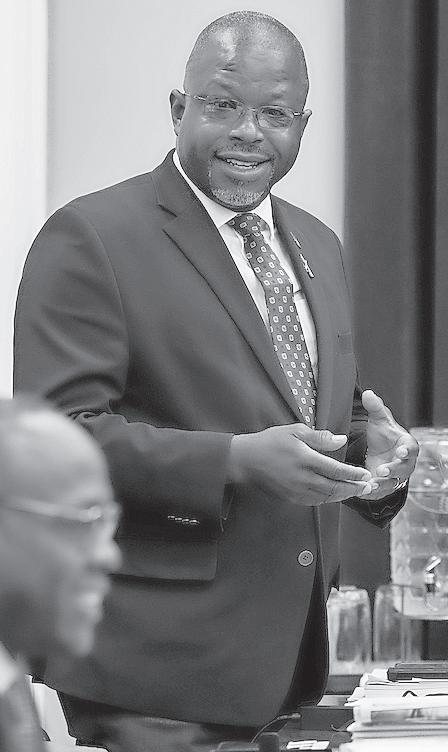
By KEILE CAMPBELL Tribune Staff Reporter kcampbell@tribunemedia.net
NATIONAL Security Minister Wayne Munroe has announced plans to overhaul procurement protocols for the Royal Bahamas Defence Force (RBDF) to expedite vessel repairs and maintenance.
This follows outgoing Commodore Raymond King’s warning in an exclusive interview with The Tribune that bureaucratic delays are compromising the RBDF’s operational readiness.
Commodore King, set to retire this week, highlighted that prolonged approval processes have hindered critical vessel repairs. He advocated for special provisions to streamline procurement within the armed forces.
“You know, every time we shorten the procurement process, those other fellas carry on, ay? As if you killed the Pope,” Mr Munroe quipped yesterday, emphasising the resistance faced when attempting to expedite procedures.
He noted that the current procurement process for repairs isn’t governed by any Defence Force instructions issued by the Minister.
He revealed that even routine maintenance requires approvals from up to eight officials — a process he deems excessive for basic repairs like dry docking. He contrasted this with major acquisitions, where such scrutiny is justified.
“If you’re talking about acquiring a $30, $35m patrol craft, yes, but if you’re talking about maintenance and dry docking, and no, that doesn’t make sense,” he said. He added that he would await
recommendations from the incoming commander and deputy commander on addressing these issues.
He also disclosed that RBDF vessels are routinely deployed on 30-day patrols, exceeding manufacturer-recommended endurance limits, which is 14 days for 30-metre crafts and 21 days for 42-metre crafts. He mentioned that the 60-metre class patrol craft is also pushed beyond its endurance, though an “endurance plus 50 percent” policy is applied in emergencies.
“We’ve been told we need two more patrol crafts and an auxiliary craft like the Lawrence Major that can get into every Family Island, because the Lawrence Major cannot get into every Family Island because of how much water she draws,” he said, highlighting capacity constraints within the current fleet. He emphasised that some vessels cannot access several shallow-draft ports across the Family Islands, limiting the Defence Force’s reach during emergencies and routine missions.
“I had actually mandated that they could only serve for their endurance level, and in an emergency, the endurance level plus 50 percent, but it should not routinely exceed its endurance level,” he said.
Regarding the country’s firefighting capacity, which has come under criticism recently, he reiterated that the government is working to acquire new equipment, including ladder trucks for the capital. While he did not specify a total number, he said officials have identified the required apparatus — such as tankers, ladder trucks, and pumpers — and are in the process
By KEILE CAMPBELL Tribune Staff Reporter kcampbell@tribunemedia.net
NATIONAL Security Minister Wayne Munroe says he is unaware of any failure by The Bahamas to meet its obligations under an international child abduction treaty following a US report listing the country among the worst offenders.
He denied any known violations under the Hague Convention on the Civil Aspects of International Child Abduction and said his ministry oversees the Trafficking in Persons Secretariat and has seen no such issues.
“Abduction cases, I’m not aware of that,” Mr Munroe said. “I know that my ministry coordinates the Trafficking in Persons Secretariat, and we maintain the highest level of compliance for that.”
He speculated that the US assessment might stem from custody battles involving parents rather than human trafficking.
“It may be based on things like, there’s a case where they say someone abducts their own child, comes there and then you have to act, engage the co-op process to address it,” he said.
He added that The Bahamas is a Hague Convention signatory and said he previously worked on such matters in private legal practice. He said as a lawyer, “there were a number of cases that I was involved in that involved cases under the Hague Convention on child abduction type, the children being here in The Bahamas, and children who were taken from The Bahamas to the US or to Canada”.
“So I don’t know what would cause that to be said about us,” he added.
The US State Department’s 2025 Annual Report on International Child Abduction designated The Bahamas as one of 15 nations showing “a pattern of noncompliance,” citing chronic delays, lack of legal action, and poor communication with US authorities. The report highlighted an average delay of over seven months in locating children once applications were filed.
Secretary of State Marco Rubio noted The Bahamas was the only new addition this year. The US government said it would continue intensive engagement with Bahamian officials to resolve the compliance issues.
of finalising orders with suppliers.
The issue drew heightened public attention following last week’s Bay Street blaze, where residents questioned whether the fire could have been contained sooner with additional resources.
Director of communications Latrae Rahming has said the government is acquiring 15 to 20 fire trucks, some earmarked for the Family Islands.

I live and work in Black Point Exuma for all my life and I see the back and forth about this project in Sampson Cay. I am the captain of Silent Partner. The whole Silent Partner crew is from Black Point and we want to make sure that our children have the chance to keep sailing. Yntegra’s sponsorship gave us a chance to sail again and we won our race at the regata in
Georgetown last week and the Best of The Best Regata in 2023. I support Yntegra and all it has done for us in Black Point. We see them all the time and we know how much they are already helping us outside of sailing. They donated to the clinic and the school, just donated bikes for the children and they support local sports and businesses. People
might think we don’t know any beter but we know what we need and nobody else is doing what these people are doing. When they say they will do something they will do it. I want everyone to know that we need the jobs. We need the tourists to come. We want everyone to come. I think it would be wrong for one person to be able to stop what the people
who live here want to happen. People can have their opinions, and that’s fine. But from where I sit, Yntegra has been with us and they will help us to get what we need. That’s why they have my full support.
~Captain Leonard “Buzzy” Rolle
T HERE was fake news since the beginning of news gathering and reporting. News and information have been manipulated throughout human history.
Today, given the nature of technology, including AI and algorithms, as well the diabolical ease with which certain leaders like Donald Trump perpetuate falsehoods, it is in various ways more difficult to discern truth from lies and fact from fictious memes, news, and “information”.
The American writer and literary critic E dgar Allan Poe (1809-1849), who lived to be only 40, was the master of the macabre and the mysterious, which enlivened his short stories and poetry. H is works include: The Purloined Letter and The R aven.
A fervent sceptic, who helped to invent the detective fiction genre, Poe is credited with advising: “Believe half of what you see and nothing of what you hear.”
H e found humorous and alarming the propensity of humans to believe all manner of often dramatic and obvious falsehoods perpetuated in the public sphere by charlatans and mercenaries in politics, the pulpit, and journalism.
It is astonishing how inherently gullible are

human beings, seemingly hardwired to believe claptrap, nonsense and the sensational. We revel in magical thinking.
In the social media age it has gotten worse, with falsehoods, typically in the form of “bad news” and negative untruths, often spreading with
the velocity of a rocket blasting off from Cape Canaveral.
In the song, “Bad News”, the legendary Johnny Cash expressed wonderfully the wisdom handed down by the “old people”, as Bahamians like to say:
H a ha ha, Come on, bad news, ha ha
Well, bad news travels like wildfire, good news travels slow…”
One reason that daily newspapers, at home and abroad, typically display sensational and sometimes misleading banner headlines at variance with the actual stories, is that humans delight in the sensational and the schadenfreude or misfortunes of others, especially our political leaders and celebrities.
In the age of the telegram, news, real and false, took a longer time to spread. Today, lies, falsehoods and misinformation go viral in record
“Believe half of what you see and nothing of what you hear.”
- Edgar Allen Poe

speed.
In an article entitled, “ H ow to Spot Fake News” in Psychology Today, Dr Sander van der Linden, a social psychology professor with the Department of Psychology at Cambridge University writes: “Facts go viral less often than falsehoods. Virality is not always a good indicator of what’s important. As one recent report put it, lies often spread faster and farther than the truth.
“Viral content that gets shared over and over again is frequently based on things other than factual accuracy.”
Dr van der Linden added: “Once a headline, video, or meme reaches a social tipping point, the fact that it’s been shared a million times becomes social ‘proof’ in itself that it must be important, which sustains its virality, misinforming more and more people.
“Instead of critically appraising content, people often share (fake) news articles because they like the messenger, because the article speaks to their political biases, because the headline is provocative or simply because everyone’s doing it.”
In the echo chamber and insularity of small states like those in the Caribbean, fake news and falsehoods are readily and eagerly digested and regurgitated.
Despite the widespread realisation that there is an overwhelming volume of false news circulating, citizens are caught day after day by fake news. Our phones sound with a cacophony of beeps with messages from a variety of social media, which we answer with great frenzy, even while eating and driving.
With little thought or discernment, we near instantly resend the message, assuming that what we’ve heard or seen is truthful, no matter how many times we have subsequently learned that what we re-sent was fake, if we are fortunate enough to realise that we have been fooled yet again for the umpteenth time.
Ironically, sometimes, the more one suggests that a story is fake, the more people believe it. Facts be dammed. They often make no difference.
A scientist employed by the government was interviewed by a senior journalist on a broadcast program some years ago.
Despite presenting factual scientific information, he was told by the interviewer that his science and facts were simply wrong, though the interviewer presented no facts of her own and was unable to refute his facts.
When asked why some commentators and others simply dismissed the science-based reports he produced, this public

officer trained in the sciences, simply stated: “We are a very subjective and emotional people. We believe what we want to believe!”
The quantity and types of fake news we are digesting are like the toxic and poisonous levels of salt, sugar and fat in our diet which is leading to all manner of diseases and ill-health.
Just as we are doing physical harm to our bodies through poor diets, we are doing tremendous harm to the body politic and to our society through the junk and garbage we are mindlessly and addictively digesting from our mobile devices around the clock.
A friend reports that while getting a haircut at a barbershop one of the barbers was adamant that vaccines were a conspiracy to make people sick.
Asked where he got his information, he replied, “From online.”
This was the same retort from the manager of a business who told this columnist that much of discussion on the global climate emergency is a hoax, that the climate has warmed the planet for millennia and that we had nothing to worry about. His source was certain websites, which served as an echo chamber for his views.
Part of the mindset of some in reporting certain stories is an automatic conspiratorial mindset, which begins with the belief that something is always or typically being hidden by
public officials. With the decline of newspapers as gatekeepers, fake news is often normative, with citizens having even more difficulty filtering and recognising what is fake and what is real news and information.
Because of our entrenched biases it is not easy to discern fake news because of our biases. A story in the Business and Economy section of the University of Texas at Austin’s UT website, under the headline, “ ‘Fake News’ Isn’t Easy to Spot on Facebook, According to New Study” notes:
“‘When we’re on social media, we’re passively pursuing pleasure and entertainment,’ [Patricia] Moravec [Assistant Professor of Information] said. ‘We’re avoiding something else…’
“‘The fact that social media perpetuates and feeds this bias complicates people’s ability to make evidence-based decisions,’ she said. ‘But if the facts that you do have are polluted by fake news that you truly believe, then the decisions you make are going to be much worse.’ “
There has always been fake news and disinformation. But in the social media age, such information will be more disruptive and at times lethal because mass audiences can be efficiently targeted and quickly reached with fake news and falsehoods that we all too readily accept, as some people like to say, “as Gospel”.

By LYNAIRE MUNNINGS Tribune Staff Reporter lmunnings@tribunemedia.net
ENVIRONMENT Minister Vaughn Miller has expressed concern that the ongoing wildfires in Abaco may have been deliberately set, suggesting that arson could be a contributing factor.
Speaking outside the House of Assembly yesterday, he emphasised the need for a thorough investigation to determine the cause of the blazes, which have ravaged several communities across Abaco and other islands.
The wildfires, which have burned for more than a week, have devastated areas including Sweeting’s Village, Bahama Palm Shores, and the outskirts of Spring City. A nearby debris site in Spring City has intensified the flames, complicating containment efforts. Mr Miller pointed to indiscriminate dumping as a key contributor to the fire hazard and called for increased public education to prevent future incidents. While noting that the fire in Abaco is now 95 percent contained, Miller underscored the persistent threat of wildfires, particularly during dry spells. He remarked that despite this being a typical fire season, the frequency and intensity of recent fires suggest a troubling escalation.
Elsewhere in The Bahamas, other islands are also battling fire outbreaks. Central and South Abaco MP John Pinder has urged police to remain alert for signs of arson, citing suspicious patterns — such as fires igniting upwind — that suggest they may have been intentionally set.
Health concerns have also emerged. Firefighters have warned that smoke from the Spring City debris site could be toxic. Central Abaco Fire Chief Danny Sawyer described the smoke as having a strange colour and potent odour, raising fears about the potential presence of hazardous materials.
The government’s handling of the crisis has drawn criticism, particularly around the role of the Disaster Risk Management Authority (DRA). Some residents have questioned the DRA’s visibility and effectiveness, noting that the agency only assumes a lead role when a national disaster is officially declared. Until then, its authority over fire management remains limited.
In response to the emergency, reinforcements from New Providence and Grand Bahama were deployed, and a US-based water plane has conducted over two dozen missions to douse the flames, playing a vital role in suppression efforts.
By PAVEL BAILEY Tribune Staff Reporter pbailey@tribunemedia.net
A PREGNANT woman convicted of vehicular manslaughter has had her sentencing deferred until after she gives birth.
Ashanti Johnson, 27, of Governor’s Harbour, Eleuthera, appeared before Justice Gregory Hilton on a charge of vehicular manslaughter in connection with a fatal crash in 2022.
According to court documents, Johnson was driving south along Queen’s Highway in Eleuthera around 3.15am on December 11, 2022, when she lost control of her black Honda Stream.
The vehicle crashed into a wall and then a tree.
While Johnson sustained only minor injuries, her passenger, Kendrick Moss, died at the scene from
injuries sustained in the collision. It was also revealed that Johnson was neither licensed to drive nor operate a vehicle insured with third-party risk coverage at the time of the incident.
She previously pleaded guilty to the charge.
During the hearing, her attorney, Jiram Mangra, requested that the court consider financial compensation to the victim’s family instead of a custodial sentence. He further argued that Johnson’s actions were more negligent than reckless.
When Justice Hilton asked about her due date, Mr Mangra informed the court that she is expected to give birth on July 4. The court has set Johnson’s sentencing for August 20. Until then, she remains on release.
By PAVEL BAILEY Tribune Staff Reporter
pbailey@tribunemedia.net
A 40-YEAR-OLD man was granted bail yesterday after being accused of passport fraud and injuring a woman last month.
Keith “Camar” Jennings appeared before Senior Magistrate Kendra KellyBurrows to face charges of possession of a forged document, uttering a forged document, fraud by false pretences, and causing harm. Prosecutors allege that on August 28, 2018, Jennings used a forged naturalisation certificate in his name at the Passport Office to fraudulently obtain a Bahamian passport.
He is also accused of injuring Tavallia Dean on Ferguson Street on April 29 of this year. Jennings pleaded not guilty to all charges after electing to have the matter
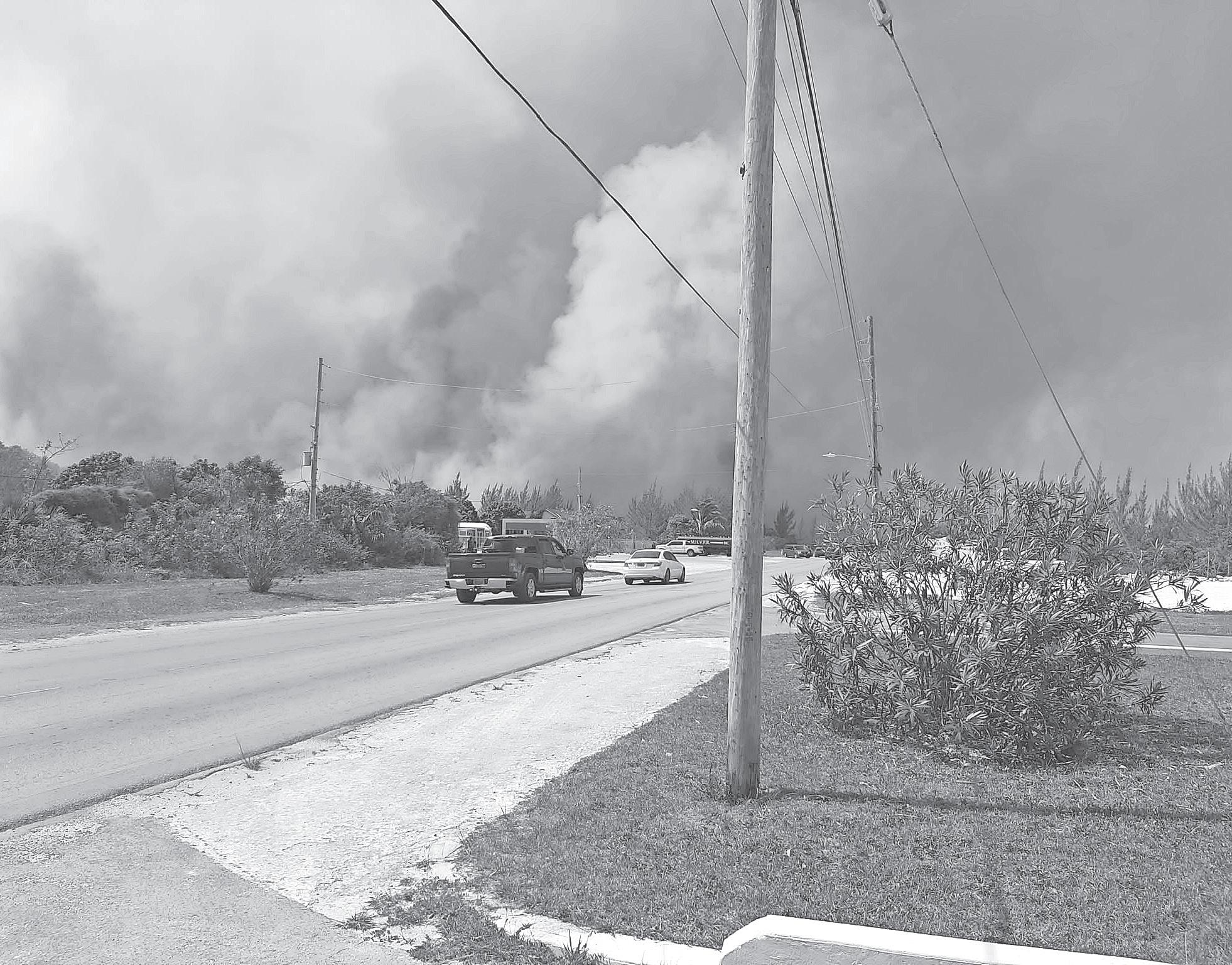
heard in the Magistrate’s Court.
Sergeant Vernon Pyfrom, the prosecutor, objected to bail because Jennings, a Jamaican national, has no legal status in The Bahamas.
However, Jennings’s attorney, Alphonso Lewis, argued that his client has strong ties to the country, noting he has five children under nine living in The Bahamas. Mr Lewis requested that bail be granted with strict conditions, pointing out that Jennings has no prior convictions.
Bail was set at $6,000 with one or two sureties.
As part of the conditions, Jennings will be fitted with an electronic monitoring device, must surrender his travel documents, and must report to the Wulff Road Police Station every Friday by 6pm. The trial is scheduled to begin on July 16.
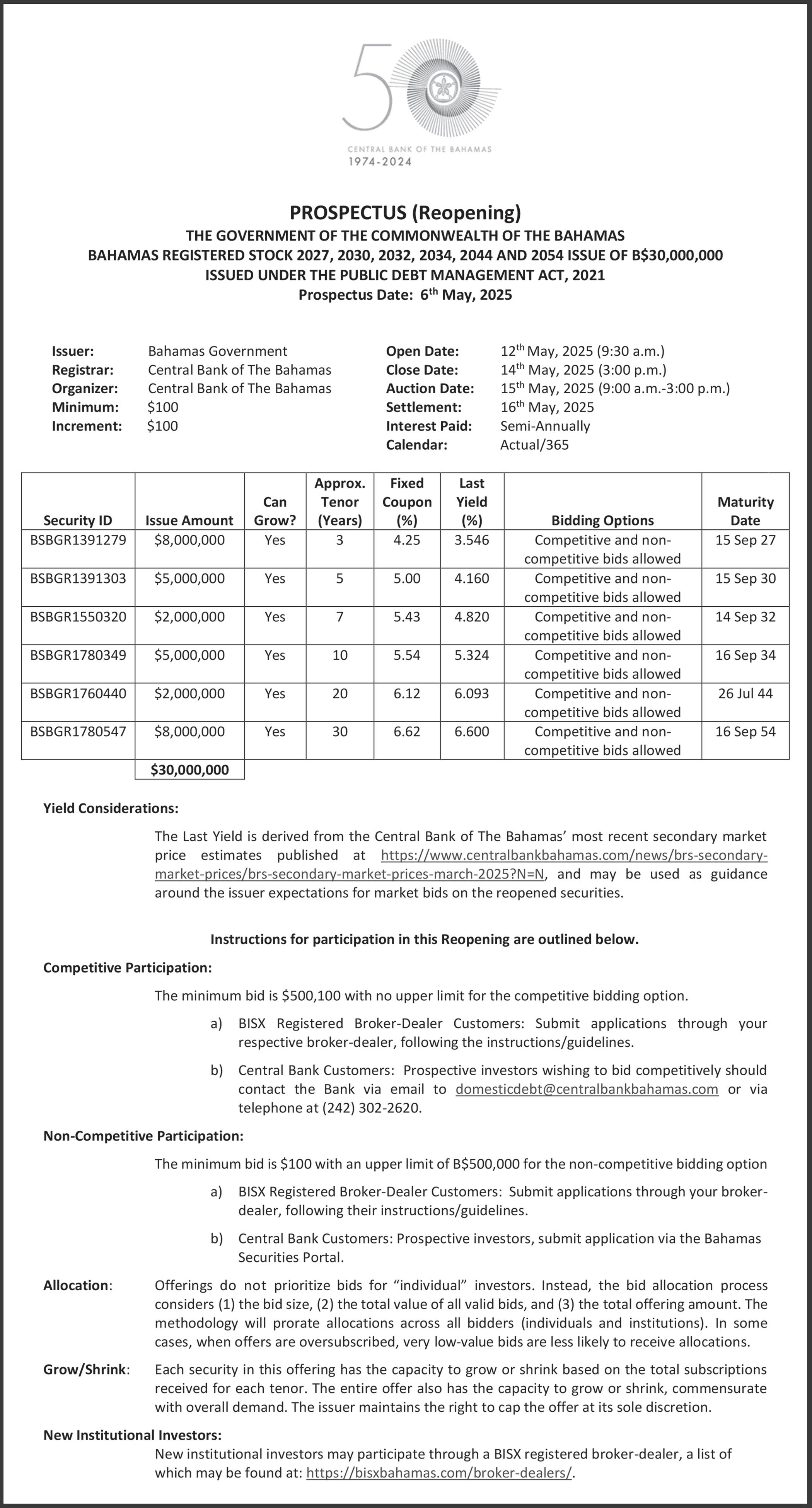
By KEILE CAMPBELL Tribune Staff Reporter
kcampbell@tribunemedia.net
FIFTY-five recruits began correctional training on Wednesday following a formal inspection by Minister of National Security Wayne Munroe, who noted they’ll undergo five months of intense cross-training in emergency response, immigration enforcement, and security screening.
The move is part of a broader effort to strengthen the country’s national security infrastructure through multi-agency readiness.
Mr Munroe described the recruitment process as “competitive” and praised the recruits — drawn from across the country –– as “excellent” and “talented”.
While 55 recruits have started the programme, one
has already dropped out. Mr Munroe said six more candidates are being vetted to bring the final squad to 60.
The cross-training initiative is designed to create a flexible, multi-skilled workforce capable of responding to crises across agencies.
Mr Munroe emphasised the importance of preparing personnel for high-impact emergencies, including fires and immigration-related incidents.
“They’ll be available if there’s ever something that’s sufficiently catastrophic to require all hands on deck then this will be a group of people who will be available, specifically trained, as you would have heard, for fires, but clearly there can be a fire in the facility, and so they will be able to address that,” he
said. The programme will also ready officers to assist in immigration operations, including managing detainees and reinforcing border protocols during emergencies. Mr Munroe positioned the strategy as vital for national resilience, referencing recent episodes of industrial unrest.
“One would see that we have now and again industrial unrest, so cross-training people in immigration screening, in terms of airport screening, because officers air screen items coming into the prison for the same sort of items that you would screen at an airport checkpoint, and so they train broadly to be broadly available as members of a discipline for us here to do service to the country,” he said.


By PAVEL BAILEY Tribune Staff Reporter
pbailey@tribunemedia.net
A 27-YEAR-OLD
man has been remanded to custody after being accused of committing an armed robbery on Ferguson Road in March.
Dameko Nottage appeared before Chief Magistrate Roberto Reckley yesterday, charged with the armed robbery of Lewis Sweeting.
Prosecutors allege that on March 17, Nottage approached Mr Sweeting in a vehicle and, at gunpoint, stole his Samsung
A30 cellphone during a drive-by mugging. The phone is valued at $300. Nottage was not required to enter a plea.
He was informed that the case would proceed to the Supreme Court through a voluntary bill of indictment (VBI).
He was also advised of his right to apply for bail through the higher court.
Nottage will remain at the Bahamas D epartment of Correctional Services until the VBI is expected to be presented on August 21. Inspector Deon Barr served as the prosecutor.
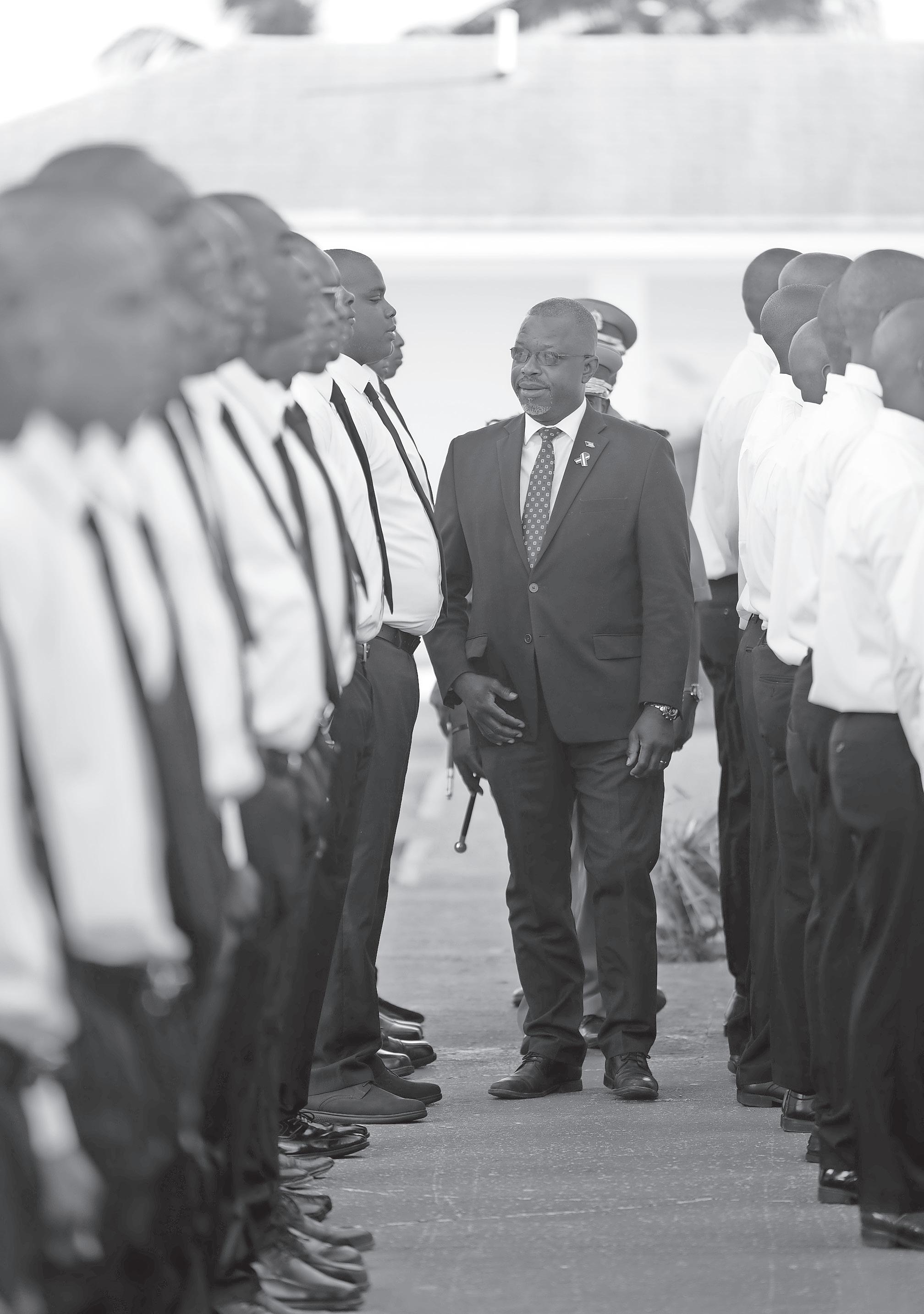
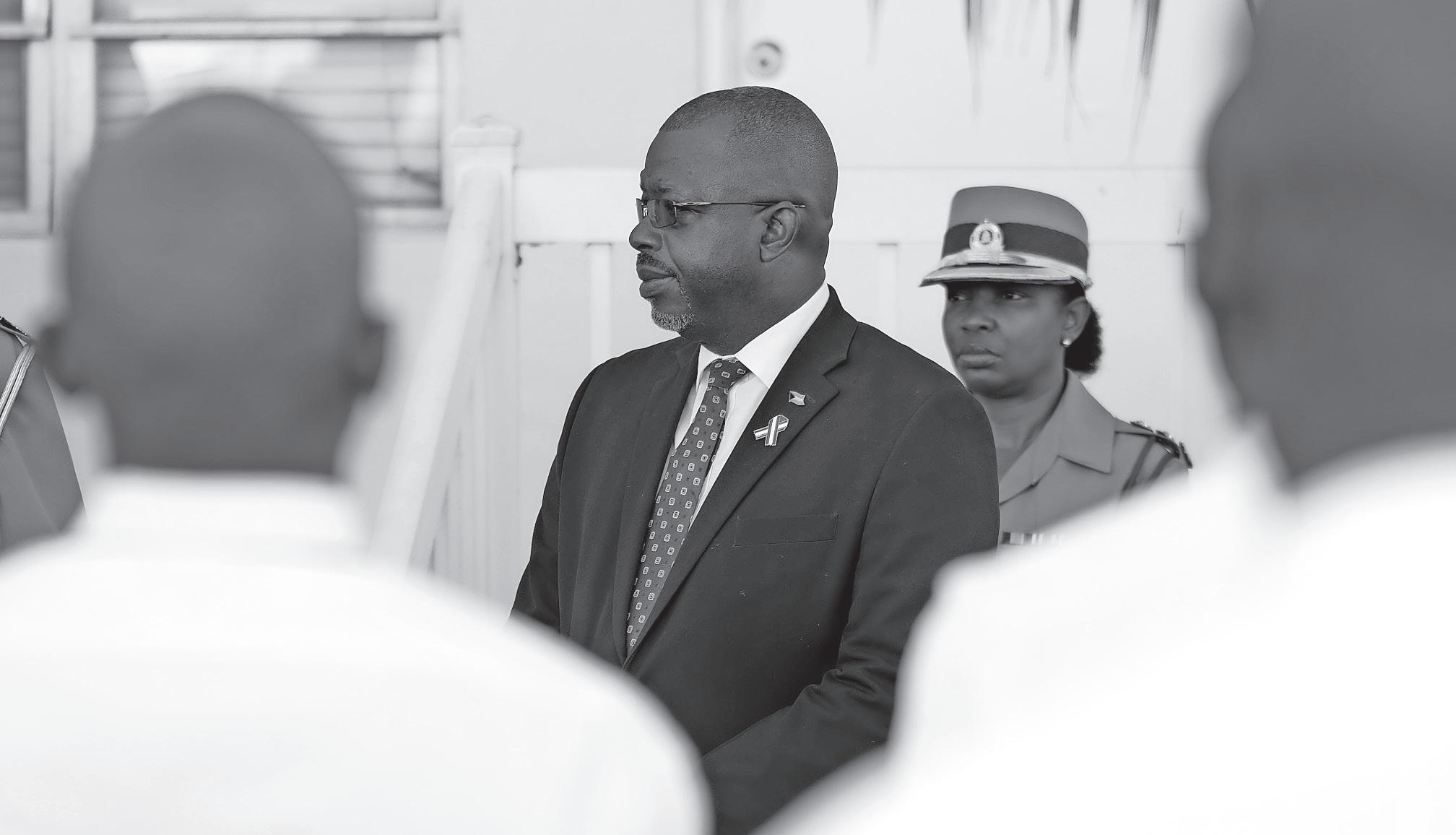
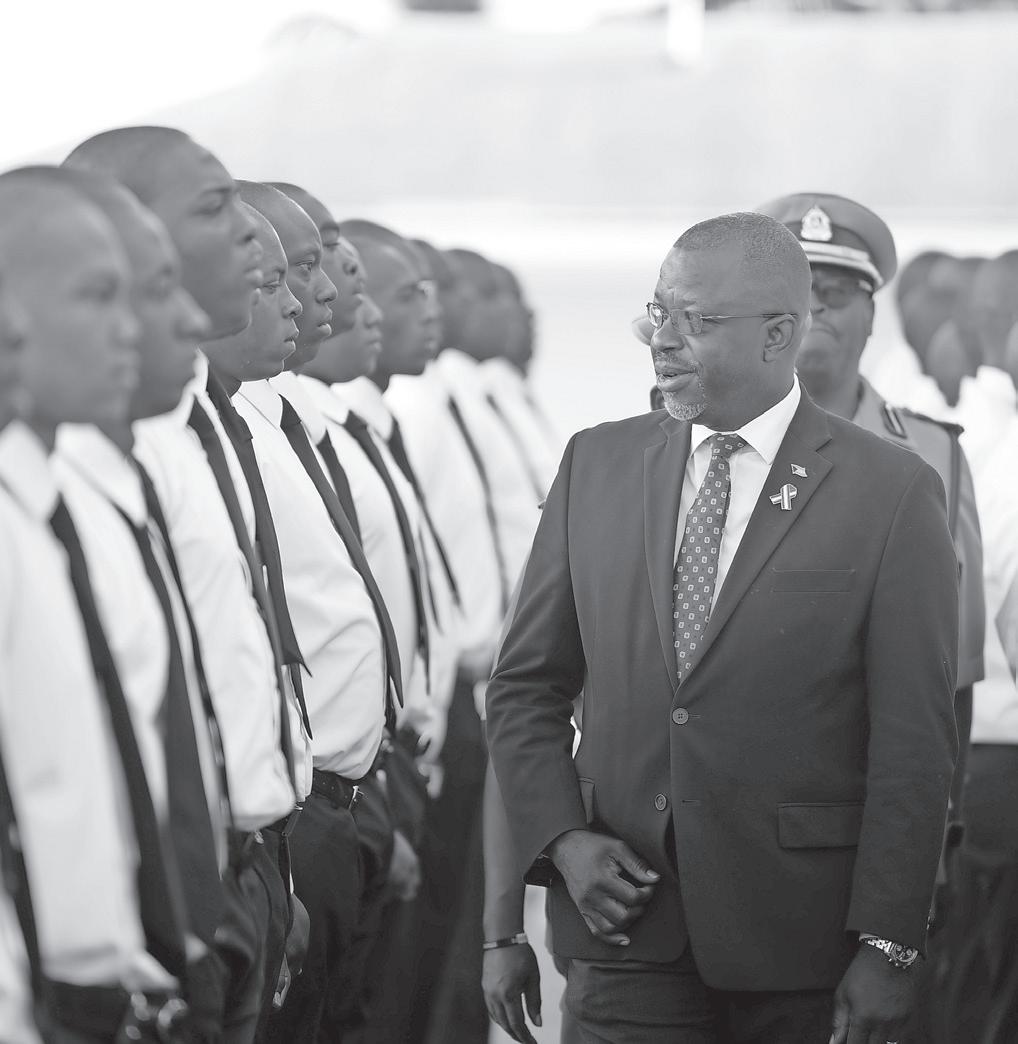
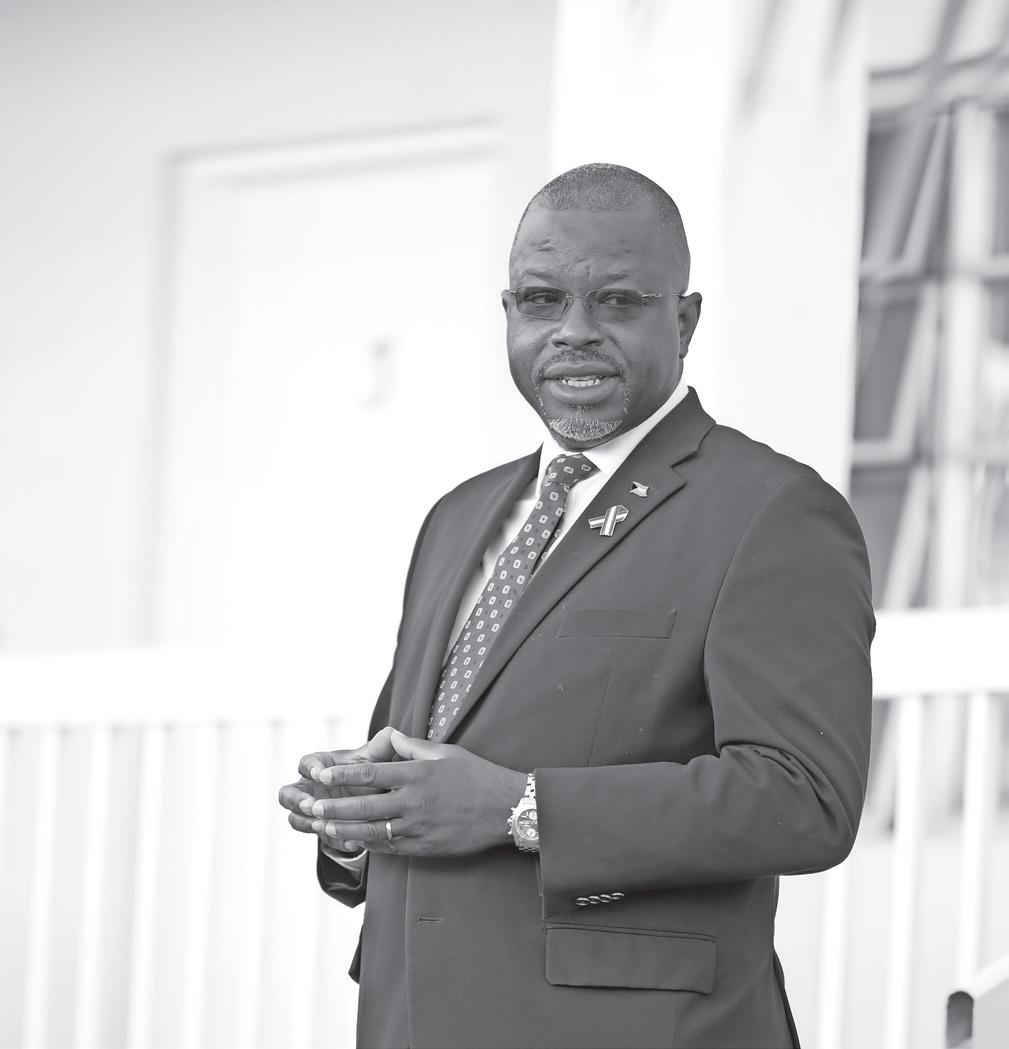

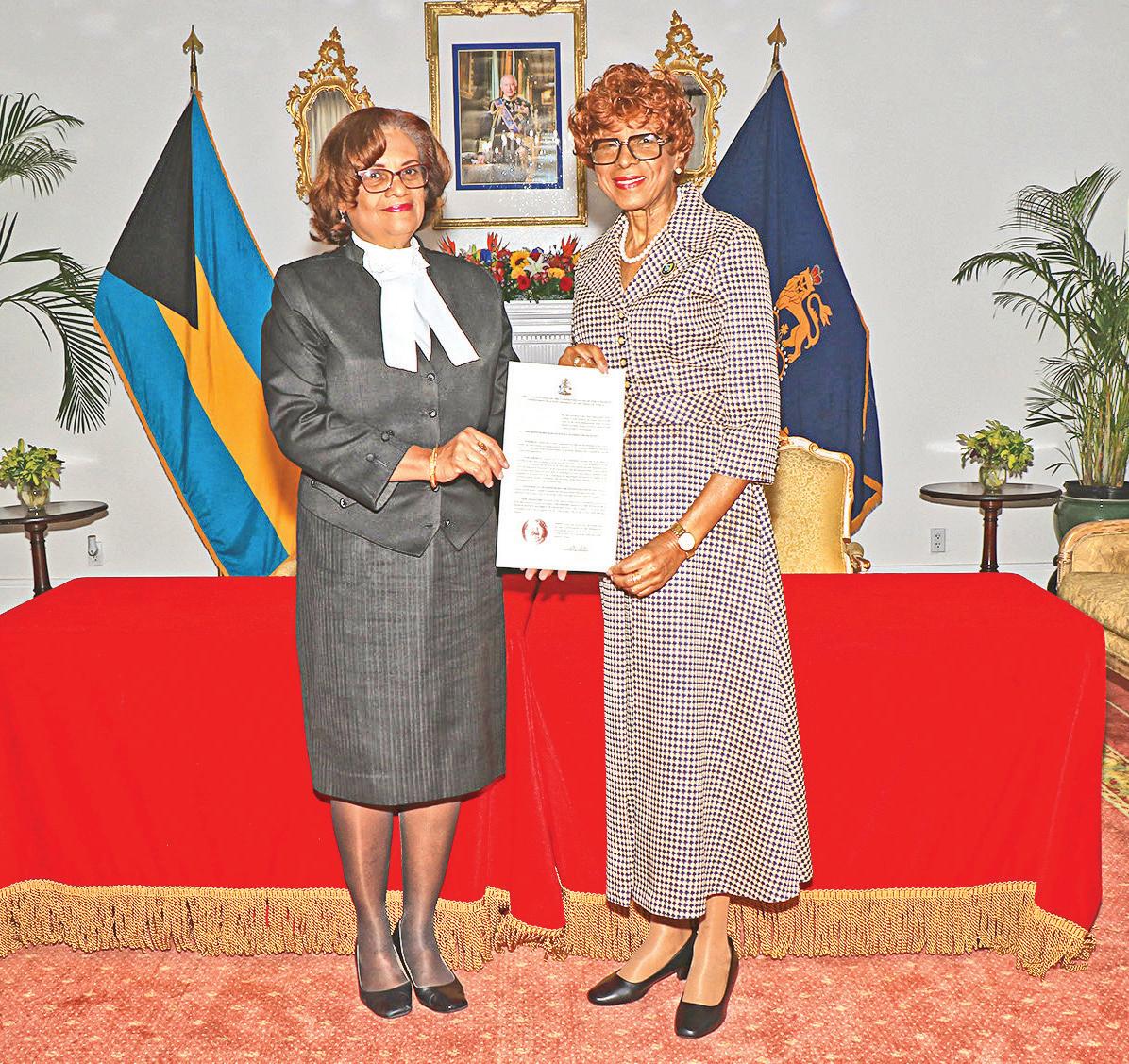
MADA M Justice Maureen Crane-Scott was administered the Oath of Allegiance, the Judicial Oath and presented with the Letter of Appointment as acting president of the Court of Appeal by Governor General Dame Cynthia ‘Mother’ Pratt during a Swearing-In Ceremony in the Drawing Room at Government House on Thursday, May 1, 2025.
Letisha Henderson/ BIS
